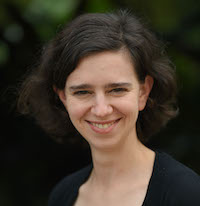Kehilla: Back to the Future
This month’s post is by Melanie Weiss, Director of Summer Programs at the Center for Small Town Jewish Life.
The Center for Small Town Jewish Life has, at its core, an idea of kehilla
that is at once progressive and forward-looking and retrograde in the best of ways. We firmly adhere to the proposition that the Jewish community must provide a sense of community that is deep, organic, purposeful, and infused with kedusha.
Our constituency represents a group cited by Rabbi Sid in his essay: the “small segment of the community that is truly unable to bear the high cost of Jewish living.” We offer such Jews a community that could be a place for kedusha. But in making that case to Jews living in a small town we know that we are in competition with non-Jewish spiritual retreats or a yoga center. We know that we are asking for the time, energy, and interest from people who don’t have many resources to spare.
Furthermore, we strongly concur that the free/handout model of Jewish institutional life leaves many aspects of Jewish living ultimately demeaned. If what you’re providing has no cost, it might well convey the idea that it has no value. If our general orientation to the organized Jewish world is to passively take and take in, how will we learn what is expected of us in terms of what to give and how to engage? The Center provides few of its programs entirely for free. Rather, we embrace a number of solutions: First, while we do have pricing models, they are calibrated (and as our communities shift and grow and change, occasionally recalibrated) to hit the fine line of creating a sense of buy-in without creating economic hardship. That means that our camp-like summer children’s programming costs only $5 a day – but that base amount is paid by every participant, and we know from parents that that creates for them some sense of commitment, and some sense that they are contributing to the ultimate goal of creating vibrant Jewish lives for their children. We try to minimize the number of participants forced to ask for scholarships, understanding that this dignity-shredding experience can get in the way of generating a sense of kedusha from the engagement.
We also understand that investment is a concept that goes beyond simple transactions. When we ask for investment in our communities, in our programs, and in our organization, we are mindful of the college sophomore who plans rides for her entire dorm to an offsite event; of the teenager who provides a shift of childcare in return for entrance to a lecture with a famous author; of the adult who commits to a series of serious learning sessions even after a long day of work. The people who commit time and resources to our program are as important to our undertaking as are our financial supporters.
One area of our work in enhancing the kedusha of our kehillot is our emphasis on intergenerational work and dependence. The Center was originally born from the deeply fruitful interactions of a dwindling small-town synagogue with the equally tiny Hillel at a local liberal arts college. The Jewish world may be fracturing along a covenantal/tribal fault line, and those camps may largely divide themselves by age, but in our small towns, the size of our community helps force us into real, authentic relationships with one another. It may not change our orientations towards the larger world, or towards various parts of the Jewish world, but it keeps us from turning our back on those with a different conception of identity, a different set of politics, or different kinds of Jewish backgrounds.
It is also interesting to understand how small-town life pushes against some of the assumptions about what constitutes a Jewish community. It turns out that our lack of options actually contributes to our relatively high levels of affiliation and coherence as a community. You don’t need to worry about donating to a Federation in Waterville, Maine – because there isn’t one. You don’t need to think about whether to become a member at the JCC – because there isn’t one. Of course, we live in the 21st century, so everyone has heard of various Jewish non-profits, and has friends with opinions about Israel on Facebook. But we discuss these things over a Shabbat potluck at our one synagogue, and in that way, the true holiness of being in community with each other still shines through.
[themify_hr color=”light-gray” width=”50%”]
Melanie Weiss is the Director of Summer Programs at the Center for Small Town Jewish Life. A native of New York, she loves living in Maine with her wife and daughters.


